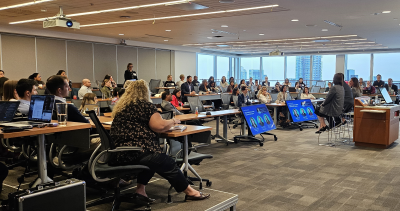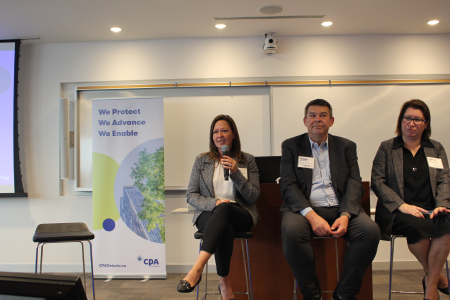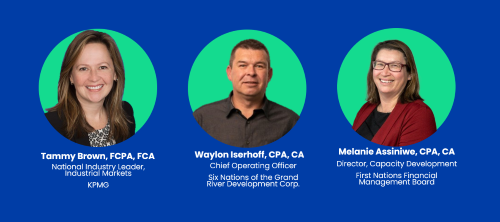Accounting for Indigenous Representation in the Profession
To achieve economic reconciliation, Canada needs to create more inclusive opportunities for its growing Indigenous labour force.
Indigenous CPAs are currently underrepresented in the profession. While Indigenous Peoples represent 2.9 percent of Ontario’s population according to the 2021 census, voluntarily provided data by CPA Ontario members in our 2024 Annual Report reveals only 0.4 percent of CPAs in the province identify as Indigenous (First Nations, Inuit, and Métis).
While a recent Conference Board of Canada/Future Skills Centre report shows Indigenous representation in business, finance, and administrative occupations has risen slightly since 2019, Indigenous People continue to experience barriers limiting access to educational pathways and opportunities.
Many systemic barriers to Indigenous professional entry and advancement persist: Indigenous communities’ limited exposure to (and trust in) Canada’s financial institutions; lack of culturally responsive programming and resources; racial bias and discrimination at school and in the workplace; or financial challenges and geographic access in remote areas.
The report explains how programs designed to support Indigenous students can improve graduation rates and identifies several policy solutions to close the gap. Some solutions include Indigenous-led financial literacy programming at critical stages in a student’s journey, enhanced coordination between educators, employers, and Indigenous organizations, and dedicated resources for work-integrated learning.
On October 4, an Indigenous CPA-led panel discussed “Indigenizing accounting education and practice” at the Accounting for Impact Summit co-hosted by CPA Ontario, Schulich School of Business and Smith School of Business.
The three panelists agreed that encouraging greater Indigenous representation, support, and community-building in the profession must come from within: If today’s Indigenous students are to join the next generation of CPAs, they will need to see themselves—and their own stories and opportunities—in their chosen profession.

Indigenizing Accounting Education and Practice
In sharing their own experiences, each panelist affirmed that Indigenous CPAs can foster culturally relevant financial literacy and management and serve as knowledge-sharing role models for the next generation by connecting with students through storytelling, mentorship, and networking.
Tammy Brown, FCPA, FCA, National Industry Leader, Industrial Markets at KPMG, explained that her Shawanaga First Nation community recognized her aspirations with scholarship support to Wilfred Laurier University, making her the first person from her reserve to attend university.
It was through KPMG’s initiative to increase Indigenous staff, and hearing that they felt alone in the workplace, that drove Tammy to focus on ensuring they had the resources they needed to find community, and success. Her proactive engagement with the firm’s Indigenous staff led to development of KPMG in Canada’s Truth and Reconciliation Action Plan.
“I have a responsibility to lead what KPMG does from an Indigenous perspective,” said Tammy, who serves as the firm’s National Indigenous Peoples Network Executive Sponsor. “While I could have written our action plan in an afternoon, we spent a year engaging with Indigenous communities, advisors and staff, along with our clients and firm leaders across the country and built a meaningful and long-lasting plan that everybody owns.”

Waylon Iserhoff, CPA, CA, COO of Six Nations of the Grand River Development Corporation, and a member of Taykwa Tagamou Nation, grew up in the remote Northern community of Moose Factory, ON. Waylon, whose community also funded his scholarships, earned an BA at the University of Western Ontario and an MBA at the Rotman School of Management, where he decided to pursue his CPA.
His early career spanned a variety of senior accounting roles at public corporations including Deloitte and the Hudson’s Bay Company, before he returned home to “give back to Taykwa Tagamou Nation” as their Business Development Officer.
“Through my role as an Indigenous CPA working with First Nations communities, I’m able to offer guidance and mentorship opportunities to young Indigenous professionals while maintaining ties to my home community,” said Waylon.
Melanie Assiniwe, CPA, CA, Director of Capacity Development at First Nations Financial Management Board, and an Anishnaabe-kwe from the unceded territory of Wiikwemikoong, ON, went back to school later in her career to get a BA in Commerce from Laurentian University.
After Melanie’s university professor encouraged her to pursue public accounting, and four years at KPMG, she earned her CPA and went on to become Wahnapitae First Nation’s Director of Finance. In her current role, she shares her public accounting experience and traditional teachings with representatives from First Nations, collectively working towards economic self-determination and financial management.
“I was able to take what I learned in public accounting and throughout my teaching journey and bring it to the First Nations Financial Management Board so we can teach financial literacy and management to all our nations, from Mi’kmaq to Coast Salish territories,” says Melanie. “It’s about bringing everyone to the table to ask them what they think, because our people have the answers through our traditional knowledge.”
All three CPAs agreed that while there are many paths to the designation for Indigenous students, they should have the opportunity to learn from other Indigenous CPAs who can pass their knowledge on to the next generation. That is why the mentorship and community-building support provided through programs like The CPA Ontario Foundation’s Circle of Success educational grant are so important.
“I really encourage Indigenous students to consider opening new doors and driving their careers in different ways that interest and challenge them,” said Tammy. “The CPA can lead to so many different opportunities if you’re intentional about where you want to land.”

